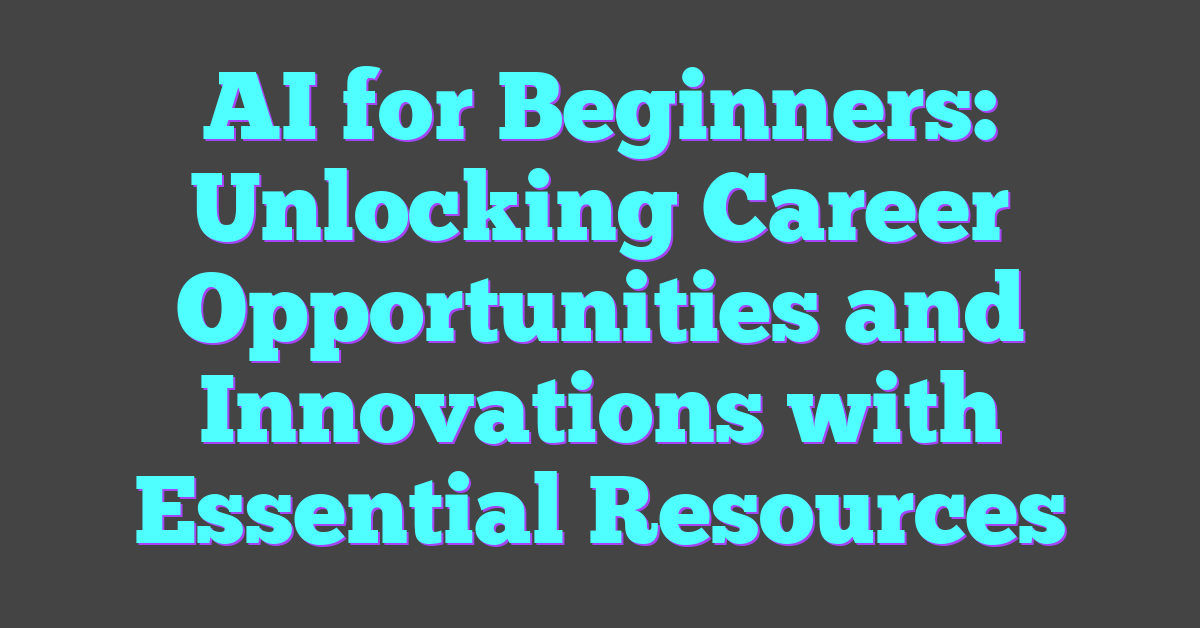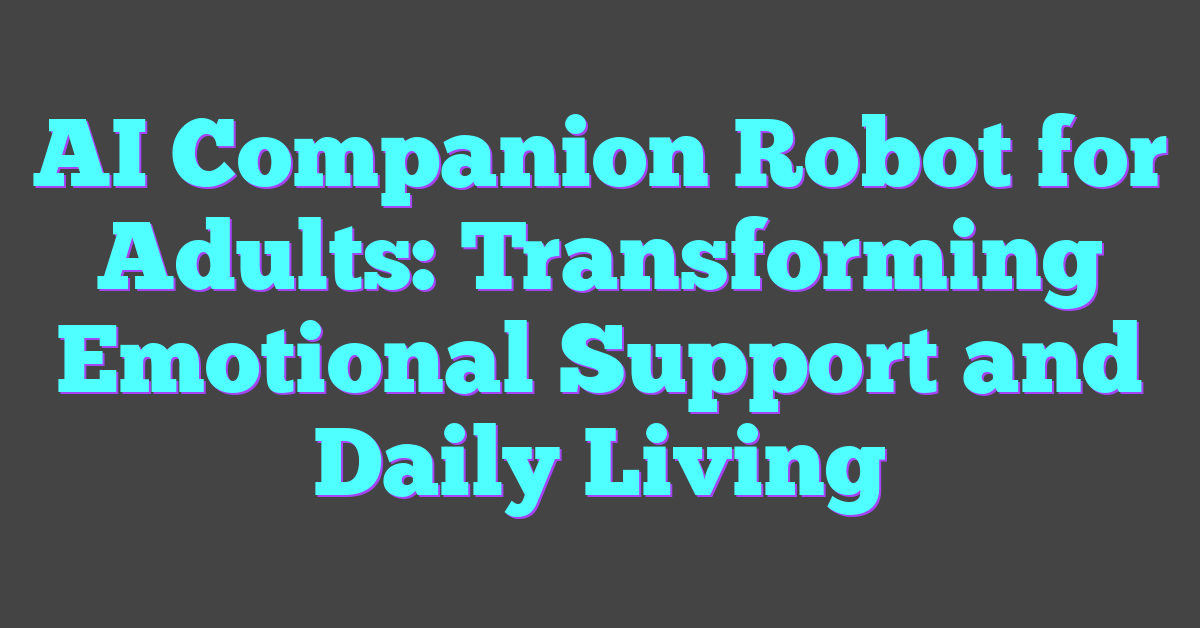Artificial Intelligence, or AI, isn’t just a buzzword anymore—it’s becoming a part of everyday life. From virtual assistants like Siri and Alexa to recommendation engines on Netflix, AI is everywhere. But what exactly is AI, and how can beginners start exploring this fascinating field?
AI might seem intimidating at first, but it’s more accessible than you might think. This guide will break down the basics, making it easy for anyone to get started. Whether you’re curious about how AI works or looking to dive into your first project, there’s something here for everyone. Let’s demystify AI and see how it can open up a world of possibilities.
Understanding AI: Basics for Beginners
Artificial Intelligence (AI) stands as a revolutionary field transforming various aspects of daily life. For beginners, gaining a fundamental understanding of AI concepts is crucial to leveraging its potential effectively.

What Is Artificial Intelligence?
Artificial Intelligence refers to the simulation of human intelligence in machines. These intelligent systems are designed to perform tasks that typically require human cognition, such as learning, reasoning, problem-solving, and understanding language. AI can analyze vast amounts of data, recognize patterns, and make decisions with minimal human intervention. This capability stems from combining algorithms, data, and computing power.
The Different Types of AI Explained
AI can be categorized into different types based on their capabilities and functionalities. These types help in understanding the scope and application of AI technologies:
- Narrow AI: Also known as Weak AI, Narrow AI focuses on performing a specific task efficiently. Examples include virtual assistants like Siri and Alexa, which can understand and respond to voice commands.
- General AI: Also called Strong AI, General AI possesses the ability to perform any intellectual task that a human can do. This type of AI remains hypothetical and is a subject of ongoing research.
- Artificial Superintelligence: This type exceeds human intelligence and capabilities in all aspects. It’s a theoretical concept, often discussed in the context of future AI advancements.
Understanding these types provides a framework for recognizing the current limitations and future potentials of AI technologies.
Key Benefits of Learning AI
Exploring AI opens a world of possibilities, offering significant advantages. These benefits encompass diverse fields and influence both personal and professional growth.
Career Opportunities in AI
Learning AI unlocks numerous career paths. It caters to industries such as healthcare, finance, and technology. For example, AI specialists innovate in medical diagnostics, algorithmic trading, and software development. According to the Bureau of Labor Statistics, demand for computer and information research scientists grows by 15% from 2019 to 2029, much faster than the average for all occupations.
Professionals with AI skills often command competitive salaries. According to Glassdoor, data scientists earn an average base salary of $113,309 annually. Machine learning engineers typically see similar figures, reflecting high demand and specialized skills.
How AI Can Improve Everyday Life
AI enhances daily activities by optimizing numerous tasks. Voice assistants like Siri and Alexa make tasks easier, handling reminders, searches, and smart home controls. AI also powers recommendation systems on platforms like Netflix and Spotify, curating content based on user preferences.
In healthcare, AI supports accurate diagnoses and personalized treatments. For example, radiologists use AI tools for imaging analysis, increasing efficiency and accuracy. In transportation, AI powers autonomous vehicles, potentially reducing traffic accidents and enhancing mobility solutions.
Incorporating AI knowledge enriches personal tech skills, encouraging innovative thinking and practical application.
Essential AI Concepts for Beginners
Understanding essential AI concepts is key for any beginner. Having grasped the types of AI and their potential, it’s now crucial to delve into the core concepts that drive AI technologies.
Machine Learning and Its Importance
Machine learning (ML) is a subset of AI. It involves training algorithms to learn patterns from data, enabling machines to make decisions without being explicitly programmed. ML’s importance lies in its wide application across various industries. Healthcare benefits from ML through predictive analytics, which forecast patient outcomes and streamline diagnosis processes. In finance, ML models detect fraud by identifying unusual transaction patterns. Retailers use ML to optimize inventory and personalize marketing strategies.
Examples of Machine Learning Applications:
- Email spam filters.
- Customer segmentation.
- Predictive text input.
ML enhances operations, improves decision-making, and offers a competitive edge, making it an indispensable facet of modern AI.
Neural Networks and Deep Learning
Neural networks are computational models inspired by the human brain’s structure. They consist of interconnected nodes (neurons) that process data in layers. Each layer extracts specific features from the input data, enabling complex pattern recognition. Deep learning, a subset of ML, uses neural networks with many layers (deep neural networks) to analyze vast amounts of data.
Deep learning’s impact is profound across AI fields. In computer vision, deep learning enables image and facial recognition. Natural language processing (NLP) applications, such as chatbots and language translation services, leverage deep learning to understand and generate human language. Autonomous vehicles rely on deep neural networks to interpret sensor data and navigate safely.
- Image classification.
- Voice recognition.
- Language translation.
By mastering neural networks and deep learning, beginners can unlock the true potential of AI, paving the way for innovative solutions in diverse domains.
Recommended Resources for AI Beginners
Understanding Artificial Intelligence (AI) requires diving into various learning materials. Here are some highly recommended resources to get started.
Books and Online Courses
Books and online courses provide a structured learning path that covers fundamental to advanced topics.
- “Artificial Intelligence: A Modern Approach” by Stuart Russell and Peter Norvig – This seminal book offers comprehensive coverage of AI theories, algorithms, and applications. Widely used in academic courses, it’s ideal for beginners.
- Coursera’s Machine Learning Course by Andrew Ng – Andrew Ng, co-founder of Coursera, provides practical insights into machine learning. The course covers supervised learning, unsupervised learning, and best practices.
- “Deep Learning” by Ian Goodfellow, Yoshua Bengio, and Aaron Courville – For those interested in deep learning, this book delves into neural networks, optimization strategies, and real-world applications.
Interactive Platforms and Communities
Interactive platforms and online communities enable hands-on learning and peer collaboration.
- Kaggle – As a platform offering datasets and coding competitions, Kaggle allows users to practice data science and machine learning. It’s valuable for those who prefer learning by doing.
- TensorFlow Playground – This interactive tool simplifies neural networks, allowing beginners to visualize and experiment with different models and parameters.
- AI Community on Reddit – Subreddits like r/MachineLearning and r/learnmachinelearning provide forums for discussions, questions, and resource sharing. They offer real-time learning support and networking opportunities.
By leveraging these resources, beginners can effectively build a solid foundation in AI, paving the way for advanced exploration and innovation.
Conclusion
Exploring AI can be both exciting and rewarding for beginners. With a solid grasp of essential concepts and the right resources in hand they can dive into this fascinating field. Whether they’re interested in ML applications or the intricacies of neural networks there’s something for everyone. By leveraging recommended books courses and communities beginners can build a strong foundation and open doors to endless possibilities in the world of AI. So take that first step and start your AI journey today!
Frequently Asked Questions
What is Artificial Intelligence (AI)?
Artificial Intelligence (AI) refers to the simulation of human intelligence in machines that are designed to think and learn like humans. It encompasses various subfields such as Machine Learning, Natural Language Processing, and Neural Networks.
What are the main types of AI?
The main types of AI are Narrow AI, which is specialized in one task, and General AI, which has the capability to perform any intellectual task that a human can do. Currently, most AI applications are Narrow AI.
Why is learning AI important for beginners?
Learning AI is important for beginners because it opens up numerous career opportunities and helps in understanding advancements in various sectors, including healthcare, finance, and retail.
How does Machine Learning (ML) apply in real life?
Machine Learning (ML) is utilized in predictive analytics, fraud detection, personalized marketing, and more. It powers many applications in healthcare, finance, and retail by analyzing data and making informed decisions.
What are Neural Networks?
Neural Networks are computing systems inspired by the human brain’s network of neurons. They are crucial for tasks like computer vision, natural language processing, and autonomous vehicles.
What resources are recommended for AI beginners?
Recommended resources for AI beginners include:
- Books: “Artificial Intelligence: A Modern Approach” and “Deep Learning”
- Online courses: Coursera’s Machine Learning Course
- Interactive platforms: Kaggle and TensorFlow Playground
- AI communities: Reddit communities on AI topics
How can AI improve daily life?
AI improves daily life through applications like virtual assistants, recommendation systems, autonomous driving, and smart home devices, making tasks easier and more efficient.
What is the role of Deep Learning in AI?
Deep Learning is a subset of Machine Learning that uses Neural Networks with many layers. It is essential for advanced AI tasks like image and speech recognition, making it crucial for developments in computer vision and natural language understanding.




